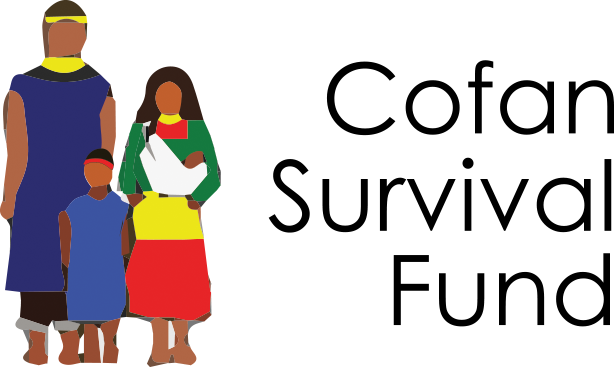The end of September/October has been a busy time for Cofan Survival Fund! Read on for a roundup of some of the projects we have been working on this year:
_
Cofan Ranger Program

First up is the Cofan Ranger training course. In September Cofan Survival Fund carried out a 2-week Cofan ranger training course with support from the Institute for Conservation and Environmental Training (ICCA in Spanish). Ten experienced Cofan rangers, four women and six men who have been working as rangers for years, came to the FSC office in Quito.

This course, funded by USAID, was a refresher for these experienced rangers, and topics covered GPS use, environmental law, professional ethics and first aid among others, and also focused on the implementation of a new control and monitoring tool from the Escuela Latinoamericana de Áreas Protegidas de Costa Rica (ELAP). This tool is a way for Cofan rangers to systematize, organize and generate products from activities that Cofan rangers, FSC and FEINCE carry out in protected areas. This tool will make it easier for Cofan rangers to manage and present the data they collect in the field and organize and report on their field activities. The rangers left Quito anxious to try out their new knowledge and ELAP tool in the field.
Randy at the Global Issues Network Conference
Randy was invited to participate in the Global Issues Network (GIN) 2013 Conference, which this year was held in Quito at the American School from October 18th to the 20th. GIN Conferences empower young people to develop sustainable solutions to address global problems and to implement their ideas with the support of the network. The key ideas are based on the book, High Noon- 20 Global Problems, 20 years to Solve Them by Jean Francois Rischard. Hundreds of high school students from around the world converged on Quito to attend the conference.
One theme students can choose to focus on is “Sharing our planet: Issues involving the global commons,” and centers on global warming, biodiversity and ecosystem losses, and deforestation, so Cofan Survival Fund fit right in! Randy was one of several keynote speakers, and also conducted a workshop entitled “How to save the rainforest: An indigenous community’s struggle against destruction and the conservation model that emerged” about carbon footprints, how the Cofan rangers stop deforestation and help reduce the amount of carbon in the atmosphere, and how all of us can do our part to lower our own carbon footprints. Cofan Survival Fund also set up a table at the conference’s NGO fair.
Socio Bosque (Forest Partner)

Another project we have been working hard on is applying for more Cofan territory to be included in the Socio Bosque Program. The Socio Bosque Program is a government initiative that pays landowners for maintaining their forest intact through 20-year contracts. Cofan Survival Fund has already successfully gotten three Cofan territories contracts in this initiative: Rio Cofanes Territory, Zábalo and Dureno. We have been working to include the Cofan Bermejo Reserve, the Cofan-managed zone of the Cayambe Coca Reserve, and the Sinangoe community.For the last two rounds in May and October of this year, for reasons outside our control (which were very frustrating) we were unable to include more Cofan territories in the initiative. This would have meant almost 150,000 hectares would have been earning funds for their environmental services, which would have gone to the Cofan for conservation and development projects.
We were pretty disappointed when we found out that our three applications couldn’t be approved…but, seemingly out of nowhere Socio Bosque officials contacted us to submit paperwork for an additional 40,000 hectares of the Zábalo territory to be included! This would raise Zábalo's annual budget to almost $120,000 total, a significant sum which would cover pretty much all of our control and vigilance activities in addition to providing administrative and community development funds for the community, essentially making Zábalo autonomous in protecting its territories. So, currently we're waiting to hear official word if our application was approved or rejected.
The Charapa Project

In our last update about the Charapa Project we told you about the $20,000 grant we got from Petroamazonas to support the project and the business plan we turned in to the Ministry of Environment to be able to sell part of the Charapa harvest, funds which would finance the project.Well, we have gotten another, smaller grant from Petroamazonas that was given directly to the Zábalo community to finance the upcoming harvest, specifically the bonus that will be given to the families who will find and monitor the turtle nests. This will be enough for about 10,000 baby turtles.
We still don’t have the permit to be able to commercialize a part of the Charapa harvest, but it hasn’t been rejected yet, so that’s good news. Stay tuned for future updates!
